French Prime Minister Michel Barnier made history by becoming the first prime minister since 1962 to suffer a no-confidence vote, as lawmakers from both the left and right of the political spectrum united to remove him from office. The no-confidence motion, which required a minimum of 288 votes in the National Assembly, garnered 331 votes in favor of his ousting. This unusual coalition was led by the left-wing New Popular Front (NPF) and the right-wing National Rally (RN), emphasizing deep political divisions within the French government. RN’s leader, Marine Le Pen, expressed that the decision was made with the intent to protect the French populace, asserting it was not a decision taken lightly but a necessary action.
In the aftermath of the vote, Jean-Luc Mélenchon, the leader of the NPF’s largest party, declared the outcome was predictable and called for President Emmanuel Macron’s resignation. Despite the mounting pressure, Macron has refused to resign, insisting that he intends to see his term through. Barnier was appointed by Macron in September, a controversial decision that sparked ire from the NPF, which had previously secured the most seats in parliament during the summer elections. Macron’s approach, which involved sidelining the NPF in favor of a minority cabinet dependent on RN’s support, may have played a significant role in the political upheaval.
The situation escalated over Barnier’s proposed social security budget, which included a substantial reduction in spending by €40 billion ($41.87 billion) and tax increases of €20 billion to address an ongoing deficit. The RN threatened a no-confidence vote unless their demands were met, reflecting a polarized and contentious political climate. Le Pen criticized Barnier for his lack of openness and willingness to negotiate, and when her party’s red lines were not addressed, the momentum for the no-confidence vote grew steadily.
Historically, the French government has faced almost 150 no-confidence motions since the establishment of the Fifth Republic in 1958, with only one successful ousting prior to Barnier’s removal—Georges Pompidou in 1962. This context of historic rarity underscores the significance of Barnier’s ousting and highlights the severe political discord present in France. The coalition between the NPF and RN, typically political adversaries, signifies a profound change in how opposition parties may work together against common political challenges.
In the wake of Barnier’s removal, speculation arises regarding his future role. He is expected to serve as a caretaker Prime Minister until Macron can identify a suitable replacement. However, the political landscape complicates this transition, as Macron’s previous appointment process took nearly two months following the July parliamentary elections. Notably, another vote cannot occur for at least a year due to constitutional stipulations, leaving Barnier in a precarious position as he navigates interim responsibilities amidst significant political crisis.
The implications of this no-confidence vote go beyond Barnier’s leadership. It raises questions about the stability of President Macron’s government and its ability to maneuver through ongoing partisan divisions. As calls for Macron’s resignation mount, the French political fabric seems on the brink of further shifts that may redefine party alliances and public sentiment in the upcoming months. The landscape of French politics appears destined for continued challenges, testing not just the Prime Minister’s temporary stewardship but also the enduring power and direction of Macron’s presidency.

